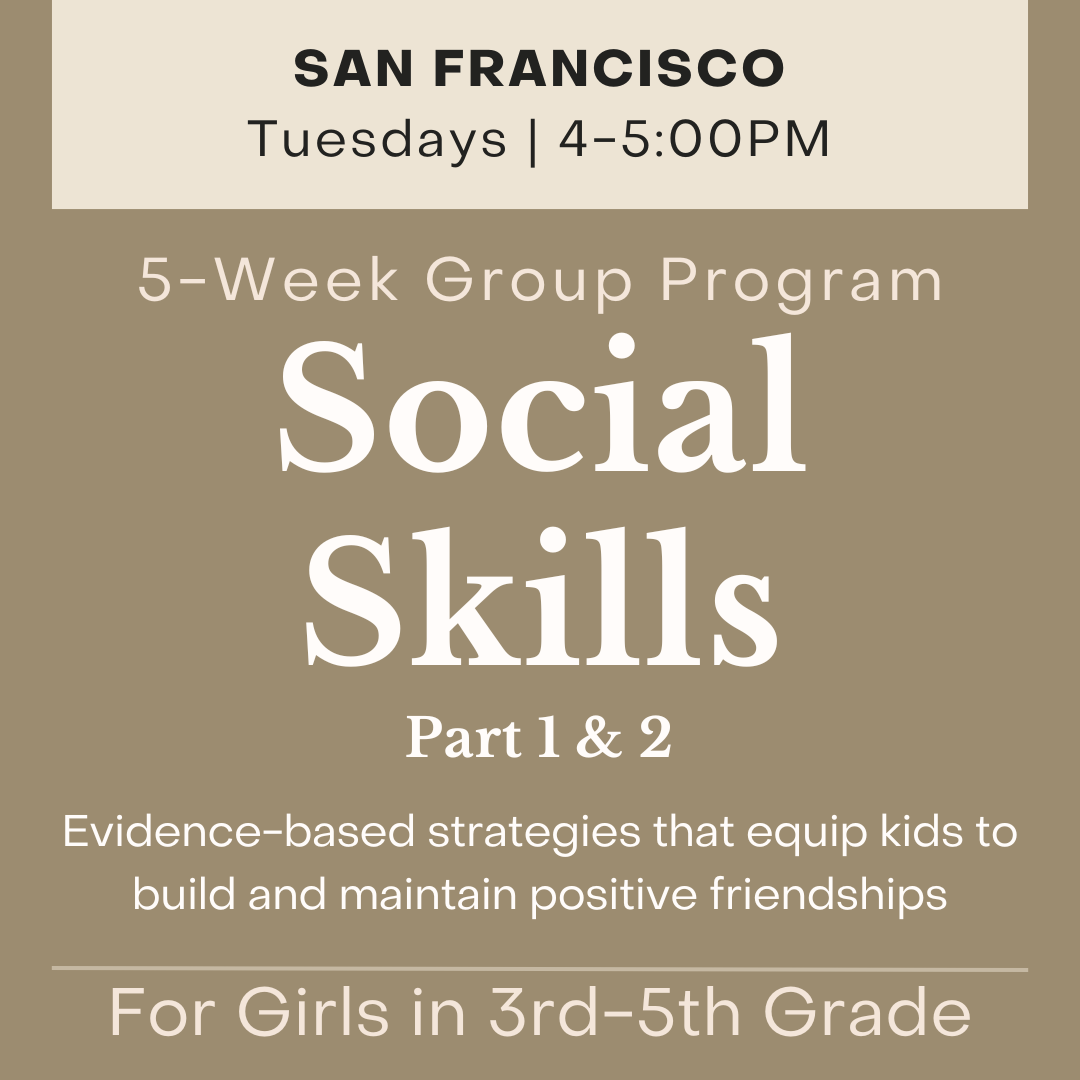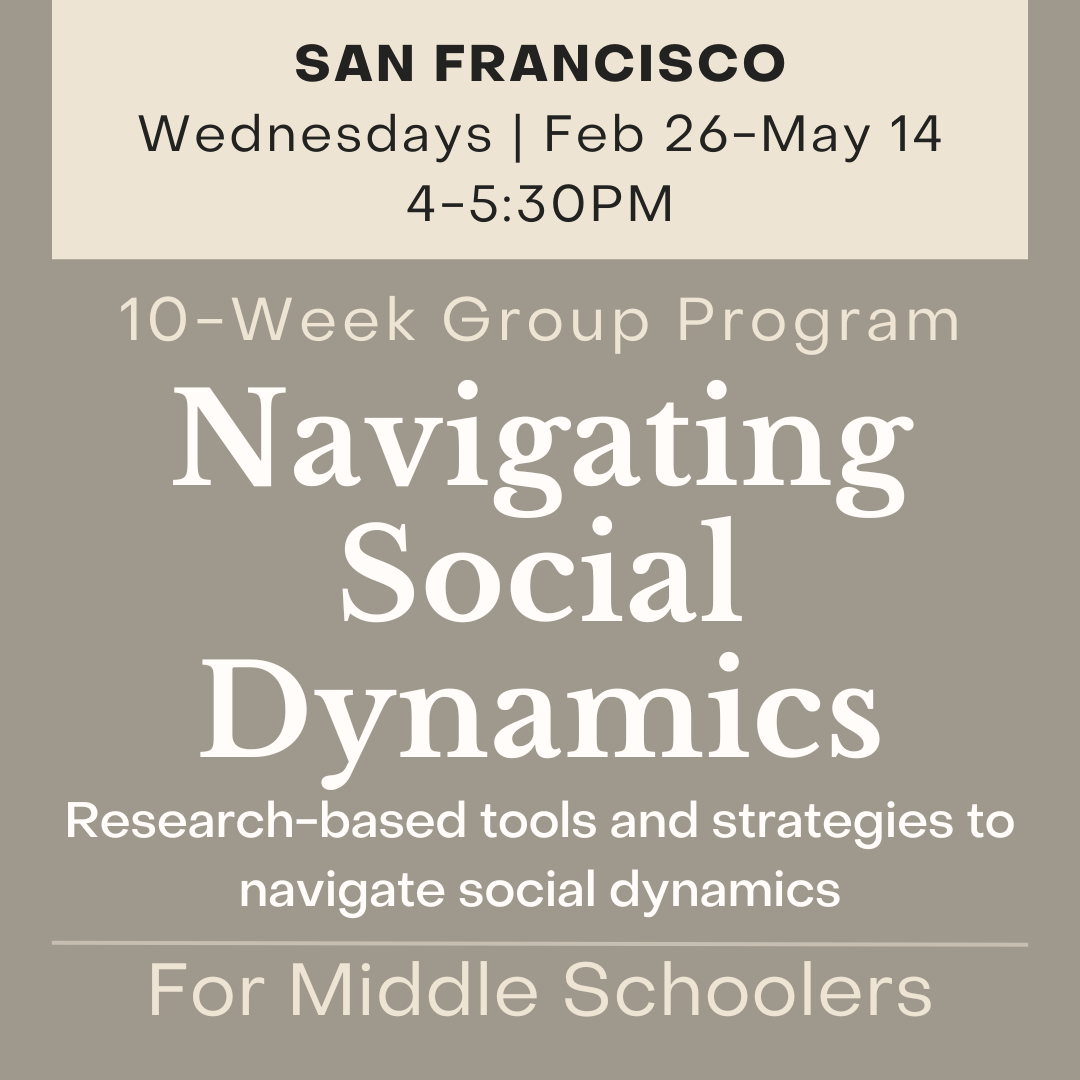January 2025: Start 2025 with support tailored for your family
This month's newsletter is brought to you by Molly McCobb, LCSW (#98584), our Licensed Clinical Social Worker, Senior Supervising Clinical, and Director of Group Programs at Practice San Francisco. (Read her bio)
Hi, Practice families!👋
The New Year is a time for fresh starts, new goals, and setting intentions that can help your family thrive. Whether you’re looking to make a positive change for yourself, your child, or both, it's an ideal time to reflect on what’s working and where you might need support. One key decision many parents face is choosing between group therapy and individual therapy—an important step in ensuring your family’s mental health journey is on the right path for success in the year ahead. 🤔
It’s common to feel uncertain about which option is best. Should you explore group therapy, where social dynamics are at play? Or does your child need more personalized, one-on-one care? The good news is that the New Year is a perfect time to re-assess your goals, make a plan, and approach therapy with a fresh perspective. Let’s take a closer look at the benefits of group therapy and how it could be a game-changer for your family in the year ahead.
The Unique Benefits of Group Therapy for Your Family
Group therapy, led by skilled clinicians, provides a supportive and cost-effective environment where participants can receive clinical support and benefit from the experiences of others. Whether it’s your child who is working on emotion regulation and social skills, or you as a parent seeking community and guidance in your role, group therapy can offer a collaborative and empowering space for growth.
Here’s why group therapy could be an excellent choice as you set your family’s goals for the year ahead:
1. A Fresh Start for Your Child
If your child is new to therapy, group therapy offers a welcoming and low-pressure environment where they can ease into the process. The New Year’s fresh energy can serve as a great starting point for learning and growing together with others who are facing similar challenges. Group therapy normalizes the experience, helping your child feel less isolated and more supported as they develop crucial social and emotional skills.
2. Building Familiarity with Therapy Before Going Individual
Making connections with a group facilitator early on in the year creates a sense of continuity. If your child later transitions to individual therapy with the same clinician or another clinician on our team, they will already have a foundation of trust and familiarity. This makes the shift into individual therapy smoother and ensures that your child’s progress is supported from multiple angles. It also allows you to set long-term goals, building on the work started in group therapy.
3. An Efficient, Cost-Effective Way to Start the Year Strong
The New Year often brings financial planning and goal-setting. Group therapy is a cost-effective option that offers families a great way to access therapy services without breaking the budget. If you're looking to make mental health support a priority in 2025, group therapy allows you to help your child or yourself in a way that's both accessible and sustainable.
4. Boosting Social Confidence
One of the best ways to kick off the year is by helping your child build social confidence. Group therapy provides the perfect setting for kids to practice social skills in real-time, interact with peers, and learn how to manage their impulses in a supportive and structured environment. The New Year can be the time to help your child make strides in social interaction, laying a strong foundation for building friendships, managing emotions, and developing better communication skills.
5. Reducing Resistance to Therapy
Starting therapy can sometimes feel intimidating, but group therapy provides an added benefit: It’s often easier to engage in therapy when your child sees that others are also working on similar goals. Hearing about the experiences of peers who have faced similar struggles can make the process feel less like a “you vs. them” experience and more like a shared journey toward improvement. This can reduce resistance and make therapy feel more approachable—making it easier for you and your child to embrace the therapeutic process in the New Year.
6. Creating Long-Term Family Goals
As the New Year begins, it's a perfect time to reflect on your family’s long-term goals. Group therapy can play an essential role in that process. Whether it's fostering emotional regulation, improving communication, or gaining social confidence, therapy—whether in a group or individual setting—can provide the support needed to reach these goals. It’s important to remember that mental health is a lifelong journey, and group therapy can be a vital part of that path, whether used alone or in combination with individual therapy.
Making the Right Choice for Your Family's Needs
Choosing between group therapy and individual therapy doesn’t have to be an all-or-nothing decision. Many families find that a combination of both types of therapy works best, depending on their unique needs. The New Year is a great time to evaluate where your family is and where you’d like to go. Group therapy can provide valuable social connections, skills practice, and cost-effective support, while individual therapy allows for a deeper, personalized focus.
As you set your goals for the year, take the time to reflect on the specific needs of your child and family. Whether you opt for group therapy to build skills and confidence in a supportive environment or individual therapy for more focused attention, the important thing is to prioritize your mental health and emotional well-being in 2025. Both options can provide you with the tools and support necessary to make this your family’s best year yet!
Check out our upcoming group programs here. If you have any questions about which therapy is right for you, we warmly encourage you to schedule a free consultation call with our Intake Coordinator or email us at hello@practicesanfrancisco.com. We are here to support you and your family in finding the best path forward.
Happy New Year! 🎊
Warmly,
Molly McCobb, LCSW
Licensed Clinical Social Worker, Senior Supervising Clinical, and Director of Group Programs
Supporting Those Impacted by the LA Wildfires
We can’t stop thinking about all of the families who have been impacted by the wildfires around Los Angeles— how tough it would be to manage both the logistical and emotional aspects of evacuating with young kids (let alone losing your home, belongings, and community). 💔 For families in and around LA— or those of you elsewhere but also feeling heavy-hearted and at a loss this week— we want to highlight a few resources:
Science journalist Melinda Wenner Moyer’s thoughtful newsletter on how (and why) to talk to your kids about the wildfires.
Wildfire-related resources from the National Child Traumatic Stress Network.
List of mental health providers offering pro bono (free) therapy to those impacted by the fires.
Our team will be making financial donations to Los Angeles Unified School District and Baby2Baby, as well as donating all of this week's subscription revenue from our Other Mothers Substack to these causes.
✨ Winter/Spring 2025 Group Programs Are Here! ✨
We’re excited to introduce our group offerings this Winter and Spring, designed to support every member of your family! Whether it’s helping kids build emotional skills and navigate friendships, empowering tweens and teens with tools for managing social dynamics, or creating a supportive space for parents, our groups offer exciting opportunities for growth, connection, and care.
Take a look at our programs below! If you have any questions, feel free to check out our FAQ page or reach out by replying to this email or emailing us directly at admin@practicesanfrancisco.com.
MIGHTY MINDS
(For K-5th graders)
5-Week Clinical Group
4:00 - 5:30PM
San Francisco (SF) & Mill Valley (MV)
K-2nd Grade:
MV: Thursdays | Feb 27 - Mar 27
SF: Thursdays | Apr 24 - May 22
3th-5th Grade:
MV: Thursdays | Apr 24 - May 22
——
Mighty Minds utilizes evidence-based cognitive behavioral strategies that support kids’ ability to regulate their emotions. We teach how thoughts, feelings, and behaviors are connected and practice mindfully paying attention to what is going on in their bodies and minds, noticing and labeling emotions as they occur.
MIGHTY MINDS 2.0
(For 3rd-5th graders)
5-Week Clinical Group
San Francisco
Thursdays | Feb 27 - Mar 27
4:00 - 5:30PM
——
Mighty Minds 2.0 builds on the skills learned in Mighty Minds to help kids further their emotion regulation and mindful awareness. Using evidence-based cognitive-behavioral strategies and new experiential games, kids will develop additional strategies for paying attention to their bodies and minds and labeling emotions with alum peers.
SOCIAL SKILLS (PART 1 & 2)
(For girls in 3rd-5th grade)
5-Week Clinical Group Each Part
San Francisco
Tuesdays | 4:00 - 5:00PM
Part 1: Feb 25 - Mar 25
Part 2: Apr 15 - May 13
——
This group helps 3rd to 5th-grade girls build social skills through fun, evidence-based activities. In the first five-week program, girls learn to build positive friendships. In the second, they focus on navigating social challenges and resolving conflicts. Participants can join either or both programs for a supportive, growth-focused experience.
NAVIGATING SOCIAL DYNAMICS
(For middle schoolers)
10-Week Clinical Group
San Francisco
Wednesdays | Feb 26 - May 14
4:00 - 5:30PM
——
In this series, participants acquire strategies to create and uphold healthy boundaries, manage stress and anxiety while navigating social situations, maintain healthy relationships, improve well-being, build resilience, and boost self-esteem.





